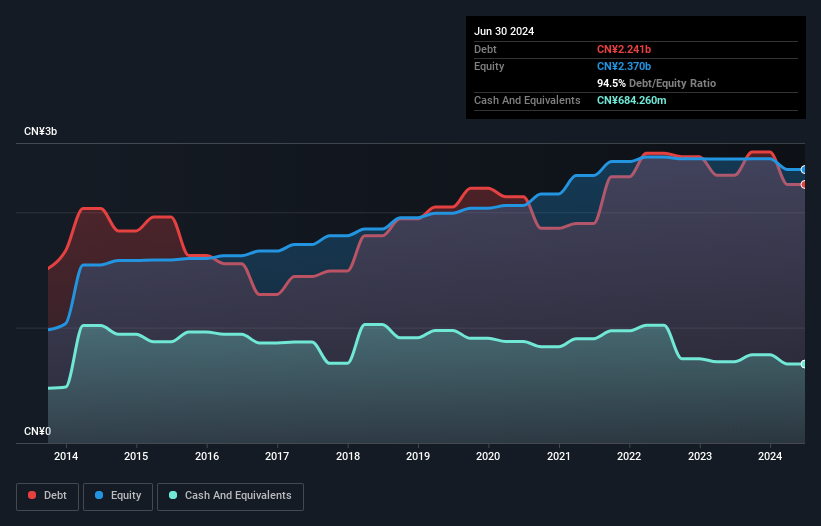
The external fund manager backed by Berkshire Hathaway's Charlie Munger, Li Lu, makes no bones about it when he says 'The biggest investment risk is not the volatility of prices, but whether you will suffer a permanent loss of capital.' It's only natural to consider a company's balance sheet when you examine how risky it is, since debt is often involved when a business collapses. As with many other companies Sunfonda Group Holdings Limited (HKG:1771) makes use of debt. But should shareholders be worried about its use of debt?
What Risk Does Debt Bring?
Generally speaking, debt only becomes a real problem when a company can't easily pay it off, either by raising capital or with its own cash flow. If things get really bad, the lenders can take control of the business. While that is not too common, we often do see indebted companies permanently diluting shareholders because lenders force them to raise capital at a distressed price. By replacing dilution, though, debt can be an extremely good tool for businesses that need capital to invest in growth at high rates of return. The first thing to do when considering how much debt a business uses is to look at its cash and debt together.
View our latest analysis for Sunfonda Group Holdings
How Much Debt Does Sunfonda Group Holdings Carry?
The chart below, which you can click on for greater detail, shows that Sunfonda Group Holdings had CN¥2.24b in debt in June 2024; about the same as the year before. However, it does have CN¥684.3m in cash offsetting this, leading to net debt of about CN¥1.56b.

How Strong Is Sunfonda Group Holdings' Balance Sheet?
Zooming in on the latest balance sheet data, we can see that Sunfonda Group Holdings had liabilities of CN¥2.67b due within 12 months and liabilities of CN¥806.4m due beyond that. On the other hand, it had cash of CN¥684.3m and CN¥34.3m worth of receivables due within a year. So its liabilities total CN¥2.76b more than the combination of its cash and short-term receivables.
The deficiency here weighs heavily on the CN¥185.7m company itself, as if a child were struggling under the weight of an enormous back-pack full of books, his sports gear, and a trumpet. So we definitely think shareholders need to watch this one closely. At the end of the day, Sunfonda Group Holdings would probably need a major re-capitalization if its creditors were to demand repayment. There's no doubt that we learn most about debt from the balance sheet. But it is Sunfonda Group Holdings's earnings that will influence how the balance sheet holds up in the future. So if you're keen to discover more about its earnings, it might be worth checking out this graph of its long term earnings trend.
In the last year Sunfonda Group Holdings had a loss before interest and tax, and actually shrunk its revenue by 7.4%, to CN¥10b. We would much prefer see growth.
Caveat Emptor
Importantly, Sunfonda Group Holdings had an earnings before interest and tax (EBIT) loss over the last year. Its EBIT loss was a whopping CN¥23m. Reflecting on this and the significant total liabilities, it's hard to know what to say about the stock because of our intense dis-affinity for it. Like every long-shot we're sure it has a glossy presentation outlining its blue-sky potential. But the reality is that it is low on liquid assets relative to liabilities, and it lost CN¥93m in the last year. So we think buying this stock is risky. The balance sheet is clearly the area to focus on when you are analysing debt. But ultimately, every company can contain risks that exist outside of the balance sheet. To that end, you should learn about the 4 warning signs we've spotted with Sunfonda Group Holdings (including 2 which shouldn't be ignored) .
If you're interested in investing in businesses that can grow profits without the burden of debt, then check out this free list of growing businesses that have net cash on the balance sheet.
Have feedback on this article? Concerned about the content? Get in touch with us directly. Alternatively, email editorial-team (at) simplywallst.com.
This article by Simply Wall St is general in nature. We provide commentary based on historical data and analyst forecasts only using an unbiased methodology and our articles are not intended to be financial advice. It does not constitute a recommendation to buy or sell any stock, and does not take account of your objectives, or your financial situation. We aim to bring you long-term focused analysis driven by fundamental data. Note that our analysis may not factor in the latest price-sensitive company announcements or qualitative material. Simply Wall St has no position in any stocks mentioned.